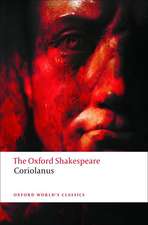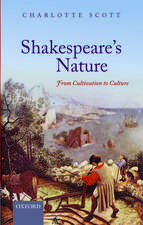Being and Having in Shakespeare: Oxford Wells Shakespeare Lectures
Autor Katharine Eisaman Mausen Limba Engleză Hardback – 14 feb 2013
Preț: 196.44 lei
Preț vechi: 228.89 lei
-14% Nou
Puncte Express: 295
Preț estimativ în valută:
37.59€ • 39.25$ • 31.11£
37.59€ • 39.25$ • 31.11£
Carte tipărită la comandă
Livrare economică 24-31 martie
Preluare comenzi: 021 569.72.76
Specificații
ISBN-13: 9780199698004
ISBN-10: 0199698007
Pagini: 150
Dimensiuni: 135 x 203 x 20 mm
Greutate: 0.27 kg
Editura: Oxford University Press
Colecția OUP Oxford
Seria Oxford Wells Shakespeare Lectures
Locul publicării:Oxford, United Kingdom
ISBN-10: 0199698007
Pagini: 150
Dimensiuni: 135 x 203 x 20 mm
Greutate: 0.27 kg
Editura: Oxford University Press
Colecția OUP Oxford
Seria Oxford Wells Shakespeare Lectures
Locul publicării:Oxford, United Kingdom
Recenzii
admirable [and] innovative ... Maus is never reductive. Her grasp of the legal intricacies is complete. This is a book that knows the difference between dominium and seisin, between escheat and forfeiture ... groundbreaking.
Maus's taut, original readings of the plays certainly belie Parvini's claim that historicism is boring.
This remarkable book, based on her Oxford Wells Shakespeare Lectures, is a splendid adjunct to Maus's classic Inwardness and Theater in the English Renaissance.
Recommended.
Maus's taut, original readings of the plays certainly belie Parvini's claim that historicism is boring.
This remarkable book, based on her Oxford Wells Shakespeare Lectures, is a splendid adjunct to Maus's classic Inwardness and Theater in the English Renaissance.
Recommended.
Notă biografică
Katharine Eisaman Maus is James Cabell Professor of English at the University of Virginia. She has published widely on English Renaissance literature, especially drama. Maus has held fellowships from the Guggenheim Foundation, National Endowment for the Humanities, American Council of Learned Societies, and Leverhulme Foundation. One of her previous monographs, Inwardness and Theater in the English Renaissance, won the Roland Bainton Prize from the Sixteenth Century Association.






















